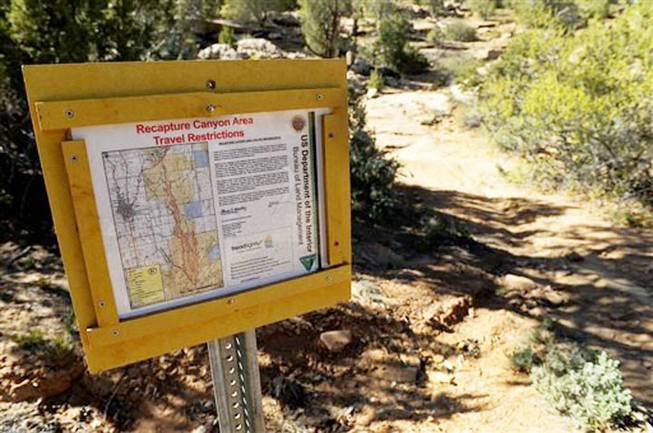
Leah Hogsten, The Salt Lake Tribune/AP
Posted signs detail restrictions on those entering Recapture Canyon in Utah. The Bureau of Land Management closed the canyon to motorized vehicles in 2007. Recapture Canyon is home to dwellings, artifacts and burials left behind by Ancestral Puebloans hundreds of years ago before they mysteriously disappeared. Environmentalists and Native Americans say the ban is needed to preserve the fragile artifacts.
Friday, May 9, 2014 | 12:32 p.m.
SALT LAKE CITY — An idyllic Utah canyon home to ancient cliff dwellings and native burials will be the site of a protest Saturday by a group of people who plans to mount ATVs and ride a trail that has been off limits to motorized vehicles since 2007.
The Bureau of Land Management is warning riders to stay out, vowing prosecution against those who ignore a law put in place after an illegal trail was found that cuts through ruins that are nearly 2,000 years old. The canyon is open to hikers and horseback riders.
The group's act of defiance is the latest illustration of growing tension between angry Western residents and the federal government over management of public lands. But the off-road protest isn't expected to end in a confrontation like other recent ones.
The BLM doesn't plan to block access or confront the riders, said San Juan County Sheriff Rick Eldredge, who has been briefed on the agency's plans. The agency will, however, document people who ride ATVs on the prohibited trail, he said.
The protest's organizer, San Juan County Commissioner Phil Lyman, said he expected hundreds at a nearby city park for a morning rally but only a handful to ride on the restricted trail. He has drummed up interest on social media but isn't recruiting militant types.
Lyman, an accountant whose family has been in the region for four generations, said the ride was a demonstration of his disgust with what he called the federal government's overreaching control of public lands and disregard for local opinion.
"They are not the supreme authority," Lyman said. "The people have a right to stand up."
Recapture Canyon is home to dwellings, artifacts and burials left behind by Ancestral Puebloans hundreds of years ago before they mysteriously disappeared. A gurgling stream in the canyon likely drew them as it does outdoor enthusiasts today.
Environmentalists and Native Americans say the ban is needed to preserve fragile artifacts. Navajos claim the people who lived there and are buried there as ancestors.
"Those ancient sites are the equivalent to churches," said Mark Maryboy, a former Navajo Nation Council delegate. "It's very disappointing that they have no respect for Native American culture."
The canyon is outside the small city of Blanding and about 40 miles northwest of the junction of Utah, Arizona, New Mexico and Colorado, known as the Four Corners.
The protest comes amid a period of high tension over BLM practices.
Last month, the BLM had a standoff with gun-wielding militants in Nevada over a dispute about the roundup of rancher Cliven Bundy's cattle. BLM ultimately stepped down. Utah ranchers and county leaders recently threatened to break federal law and round up wild horses this summer if the BLM didn’t do it first. Earlier this week, a BLM employee in Utah was threatened while driving on the highway by two men with a weapon holding a sign, "You need to die."
The federal government owns two-thirds of Utah's land, and the Republican-dominated Legislature passed a law in 2012 that demands the state be given control of those lands, excluding national parks, before 2015.
Motorized access to Recapture Canyon and other areas in Utah's wilderness has been a source of tension for decades. ATV riders rode another off-limits trail in 2009 in a protest. The BLM gave information about the riders to federal prosecutors. No charges were filed.
Lyman believes it's possible to reopen the canyon to ATVs while preserving the artifacts, contending that riders are responsible. But Jessica Goad of the Center for Western Priorities disagrees, pointing out that ATV riders blew their chance when authorities discovered two men used picks and shovels to create an off-road recreational vehicle trail in the canyon prior to the 2007 ban.
Pat Shea, a former national BLM director who is now an attorney in Salt Lake City, said acts of civil disobedience put federal agencies in a difficult position. To prevent injuries and bloodshed, they must avoid clashes and work to de-escalate situations, but coming off weak brings its own consequence.
"It's a real policy dilemma because people begin to believe they can be the law into themselves," Shea said. "Then why should people stop at red lights?"

Join the Discussion:
Check this out for a full explanation of our conversion to the LiveFyre commenting system and instructions on how to sign up for an account.
Full comments policy